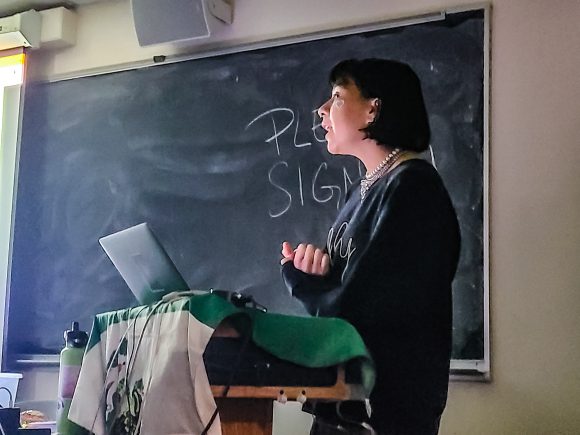
UMAS y Mecha member Bianca Perez leads the environmental action teach-in on Feb. 22, 2024 as part of the campaign to get the University of Colorado to divest from fossil fuels. (Isabella Hammond/CU Independent)
Students have begun to petition and gather a year after Fossil Free CU’s call on the Board of Regents to divest from fossil fuel company investments. The United Mexican American Students y Mecha student organization is leading the movement for environmental justice under an anti-racist philosophy.
The student organization, dedicated to empowering Latinx and Chicanx communities, hosted an environmental action teach-in on Thursday, expressing the need for the University of Colorado community to address climate injustice through an intersectional and anti-racist lens.
The teach-in, which took place at Ekeley Science, was led by UMAS y Mecha member and senior Bianca Perez. Perez spent the night presenting data and case studies, emphasizing the disproportionate impact of climate change on marginalized communities and urging for immediate action.
“It feels like we talk about the climate crisis a lot, but as something unrelated to racism, white supremacy, colonialism and imperialism,” Perez said at the teach-in, saying that she wanted this movement to be different from most environmental activism movements.
Fossil Free CU is a climate rights group that has been around since 2013, calling on the Regents to revoke funding from fossil fuel companies. Regents spokesperson Jeff Howard said investment earnings are an “important revenue stream that is used solely for the benefit of the university community.” He said investment earnings help fund things like student grants and scholarships, faculty programs, facilities and research studies.
Howard said community members or students can bring topics to the attention of the Regents during the public comment section of board meetings.
“The Board of Regents appreciates the perspectives, opinions, and engagement from a wide spectrum of students, faculty, staff, and others on all issues, including this one,” Howard wrote in a statement to the CU Independent.
One of Fossil Free CU’s leaders, sociology Ph.D. student Brigid Mark, has continued to advocate for climate justice with the group. Mark now serves on the CU Boulder Climate Action Plan Steering Committee, a group of staff, faculty and students who oversee the university’s goal to reduce to zero emissions by 2050.
The 2024 draft plan, which was released earlier this month, now includes estimates for CU Boulder’s share of fossil fuel investments and carbon dioxide emissions. Mark said this is because of the organizing of student groups and faculty on campus.
Most surprisingly, the emissions from CU Boulder’s share of endowment investments in fossil fuels is nearly three times greater than all other emissions combined, primarily natural gas heating and electricity on campus.
“What we’re working on has been focused on the Climate Action Plan and also climate justice in the Climate Action Plan,” Mark said on Fossil Free CU’s recent work. “But a lot of that has not made it into the Climate Action Plan.”

Drawing by UMAS y Mecha member Bianca Perez as seen on brochures and the petition for the University of Colorado to divest from fossil fuels. (Courtesy of Bianca Perez)
What sets UMAS y Mecha’s advocacy apart from last year’s movement is its commitment to an anti-racist approach. The teach-in emphasized that environmental issues cannot be divorced from social justice concerns, recognizing that communities of color often bear the brunt of environmental decline.
“The climate crisis is consolidating power in ways we have not even begun to address,” Perez said at the teach-in. “The investment in the fossil fuel industry is directly linked to the oppression of Black and Brown communities in the U.S.”
Perez has called on the Regents to take a step towards sustainability by divesting through a MoveOn petition. The petition, which has 130 signatures after about a week, aims to reach 18,577 signatures to attain a majority of CU Boulder’s 2023 enrollment of 37,153 students.
“Our institutions continue to fail us even though we need clean land, air and water to survive…” Perez said. “We should be demanding better from our institutions. Actually, we need to be demanding better from our institutions.”
Fossil Free CU plans to organize around the upcoming Regents elections in light of the Regents’ decision to not divest from fossil fuels last year, according to Mark. UMAS y Mecha also has plans for continued activism, including workshops and awareness campaigns.
“Today, I wanted to let us bear witness to the violence that the fossil fuel industry has produced,” Perez said at the teach-in. “If we can’t change it all, we should at least try and be a healing wound.”
Celia Frazier contributed to this story.
Contact CU Independent Editor-in-Chief Isabella Hammond at isabella.hammond@colorado.edu.
